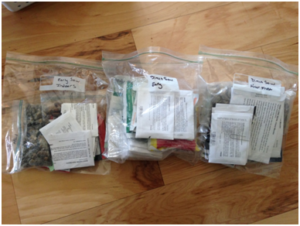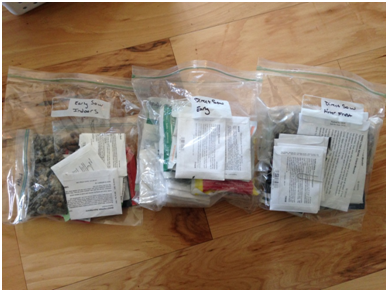Each year I like to take on a new gardening challenge. This year my goal is to be better organized—and I’ve started by organizing my seeds.
There is nothing worse than finally having the perfect planting weather and not being able to find a lettuce seed packet I know I’ve purchased. Getting my seed packets organized has proven to be a huge time saver in the garden. And, it’s a task that can be done on rainy days.
Some thrifty and nifty ways to store seed packs include inserting packs into photo albums, alphabetically organizing them into expanding file folders, or tucking them into hanging shoe organizers. The best organization method will depend on how much seed you have and where you want to store it long term.
Here is a system that works well for me:
- Group seeds together by type (carrots, peppers, tomatoes, etc). Each type gets a plastic sandwich bag. Label the baggie along the top edge so that it’s easily readable.
- The baggies are lined up in a plastic bin (shoebox size works well). When not in use, I store the seed boxes in a dark, cool corner of my basement.
- Incoming seed is placed into the appropriate baggie as it arrives. Once I have all my seeds, I pull out the bins and choose what to grow that year. At this time, I also check packet dates and toss old seeds.
- Everything being planted this season is separated into three categories. I use a 1-gallon baggie to hold each:
- Early Sow Indoors
- Early Sow Direct
- Direct Sow-After Frost.
- When it’s time to sow, I simply grab the appropriate 1 gallon baggie and take it with me to the garden or the potting table.
Below is a guideline for how long you can expect your seed to stay viable (Oregon State University). Optimal storage conditions can lead to a greater shelf life. If in doubt, you can always perform a germination test prior to planting.
1 Year: Sweet Corn, Parsnips, Spinach
2 Years: Bush, Pole Beans, Beets, Parsley, Peas, Peppers, Swiss Chard
1-3 years: Annual Flower Seed
2-4 Years: Perennial Flower Seed
3 Years: Tomatoes, Carrots, Cucumbers, Lettuce, Melons, Oriental Greens, Rutabagas
3-4 Years: Squash
3-5 Years: Broccoli, Brussels Sprouts, Cabbage, Cauliflower, Kohlrabi, Collards, Kale
4 years: Radish, Turnipscucu


